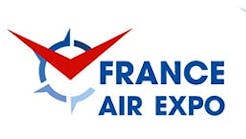Kansas State University Salina Expands Unmanned Aircraft Systems Program with New Bachelor's Degree and Minor
SALINA — With the unmanned aircraft systems, or UAS, industry growing at a rapid pace, Kansas State University Salina is meeting career demands with the addition of a new bachelor's degree and minor beginning this fall.
Combining UAS, commonly known as drones, technology with coursework in computer science, electronic engineering and mechanical engineering, K-State Salina is offering a Bachelor of Science in engineering technology with an unmanned aircraft systems option. The new course of study complements the already existing aeronautical technology bachelor's degree in UAS, which is centered around piloting and field operations, by concentrating on the design and implementation of unmanned systems. The university also is adding a UAS minor with both a flight operations focus and a data acquisition and management focus. Doctoral-level faculty members are leading the program.
"K-State Salina is known for being at the forefront of unmanned aircraft systems education and research, and our innovative engineering technology reputation spans 50 years, starting with the creation of our campus," said Verna Fitzsimmons, K-State Salina's dean and CEO. "This hybrid degree, which incorporates principles from both programs, is a practical addition to our academic offerings and an essential addition for the UAS industry."
Students enrolling in the engineering technology with an unmanned aircraft systems option degree will not have the requirement of flight ratings. Instead, they will explore the intricacies of how UAS function, such as their software and data, sensors and actuators, and camera systems and other payloads that are critical to accomplishing any task during missions. Courses will focus on different areas of electronic circuits, communication systems, control systems, machine design, manufacturing technology, materials technology and fundamentals of UAS operations.
"When most people think of an unmanned system they usually envision the pilot, not the engineers who design, build and keep it operating properly," said Saeed Khan, K-State Salina engineering technology associate professor and lead of the new program. "But the growing UAS industry needs graduates who have technical expertise and a passion for problem-solving. Previously, students would have to double major if they wanted to focus on the engineering side of unmanned systems, but this new program will give them an integrated education without added hours or costs."
Additionally, K-State Salina has created an unmanned aircraft systems minor for students outside of the UAS program and from other universities who are looking to supplement their education. The minor has two areas of emphasis: the air vehicle operations focus for those interested in flying unmanned aircraft, requiring the minimum of a Federal Aviation Administration-issued private pilot certificate with an instrument rating; and the data acquisition and management focus for students driven by mission planning, gathering and processing information, and leadership techniques.
"The ability to offer a UAS minor as part of our curriculum increases the value of our program and, in the longer view, benefits the industry by providing better prepared candidates for employment," said Michael Most, K-State Salina associate professor of unmanned aircraft systems. "Students majoring in areas that include professional pilot, agriculture, biology, wildlife science, landscape architecture and even filmmaking can now experience how UAS technology can be utilized in their field of study. The unmanned industry is expanding and this minor will make students more marketable."
K-State Salina is one of the first universities in the nation to offer a bachelor's degree in UAS. Launched in 2011, the program has nearly doubled its enrollment every year. With the expansion of the program, the university has hired another professor and is currently looking for student workers to fulfill roles as an instructor pilot and an undergraduate research analysis assistant.
For more information on enrolling in the engineering technology with an unmanned aircraft systems option bachelor's degree, contact Khan at 785-826-2677 or [email protected]. To learn about the UAS minor or the aeronautical technology with an unmanned aircraft systems option bachelor's degree, contact Most at 785-826-2681 or [email protected].




